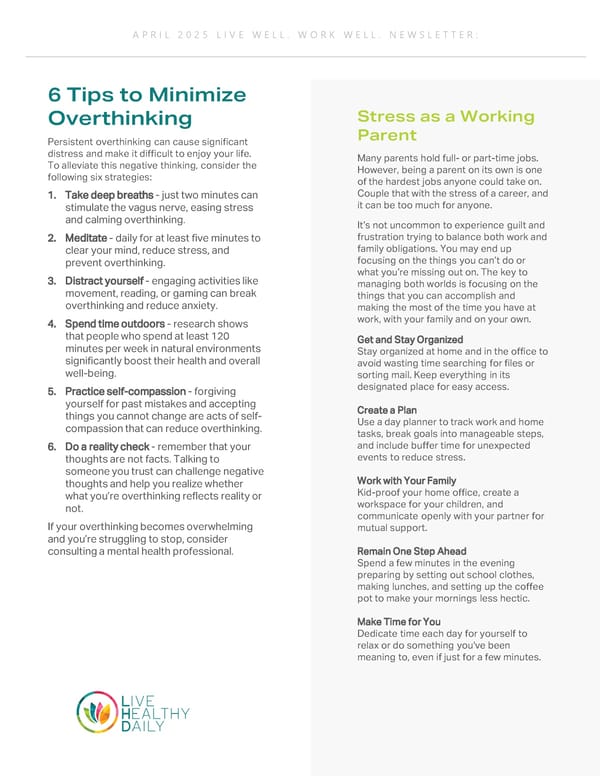A P R I L 2 0 2 5 L I V E W E L L . W O R K W E L L . N E W S L E T T E R : 6 Tips to Minimize Overthinking Persistent overthinking can cause significant distress and make it difficult to enjoy your life. To alleviate this negative thinking, consider the following six strategies: 1. Take deep breaths - just two minutes can stimulate the vagus nerve, easing stress and calming overthinking. 2. Meditate - daily for at least five minutes to clear your mind, reduce stress, and prevent overthinking. 3. Distract yourself - engaging activities like movement, reading, or gaming can break overthinking and reduce anxiety. 4. Spend time outdoors - research shows that people who spend at least 120 minutes per week in natural environments significantly boost their health and overall well-being. 5. Practice self-compassion - forgiving yourself for past mistakes and accepting things you cannot change are acts of self- compassion that can reduce overthinking. 6. Do a reality check - remember that your thoughts are not facts. Talking to someone you trust can challenge negative thoughts and help you realize whether what you’re overthinking reflects reality or not. If your overthinking becomes overwhelming and you’re struggling to stop, consider consulting a mental health professional. Stress as a Working Parent Many parents hold full- or part-time jobs. However, being a parent on its own is one of the hardest jobs anyone could take on. Couple that with the stress of a career, and it can be too much for anyone. It’s not uncommon to experience guilt and frustration trying to balance both work and family obligations. You may end up focusing on the things you can’t do or what you’re missing out on. The key to managing both worlds is focusing on the things that you can accomplish and making the most of the time you have at work, with your family and on your own. Get and Stay Organized Stay organized at home and in the office to avoid wasting time searching for files or sorting mail. Keep everything in its designated place for easy access. Create a Plan Use a day planner to track work and home tasks, break goals into manageable steps, and include buffer time for unexpected events to reduce stress. Work with Your Family Kid-proof your home office, create a workspace for your children, and communicate openly with your partner for mutual support. Remain One Step Ahead Spend a few minutes in the evening preparing by setting out school clothes, making lunches, and setting up the coffee pot to make your mornings less hectic. Make Time for You Dedicate time each day for yourself to relax or do something you've been meaning to, even if just for a few minutes.
 Identifying and Managing Chronic Stress Page 1
Identifying and Managing Chronic Stress Page 1 